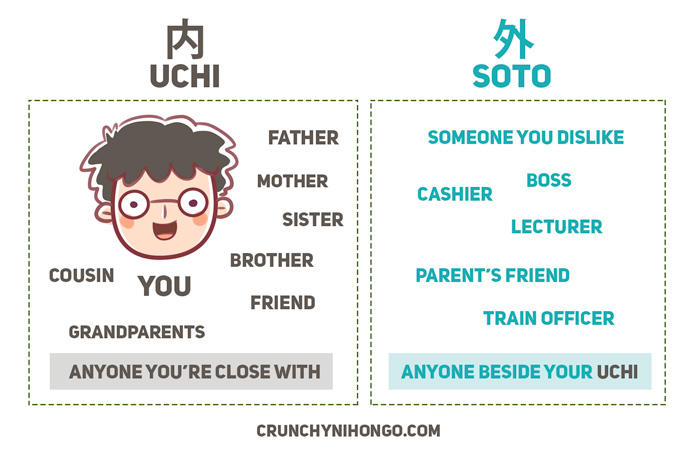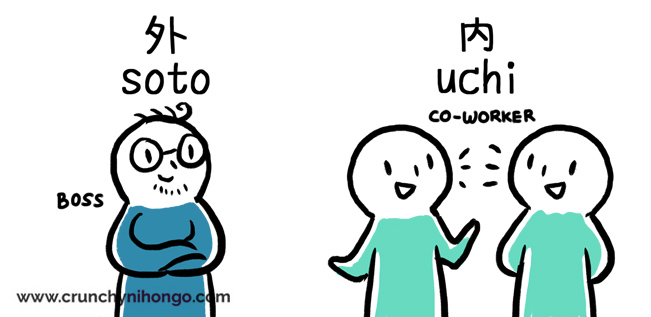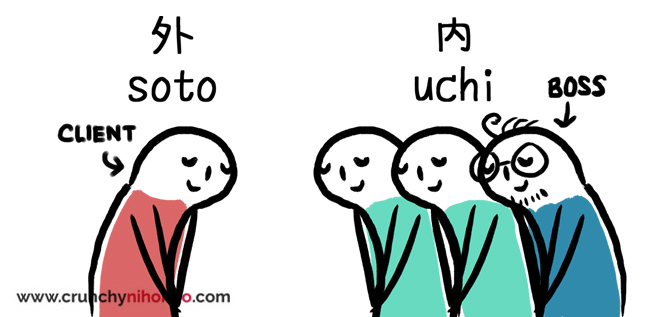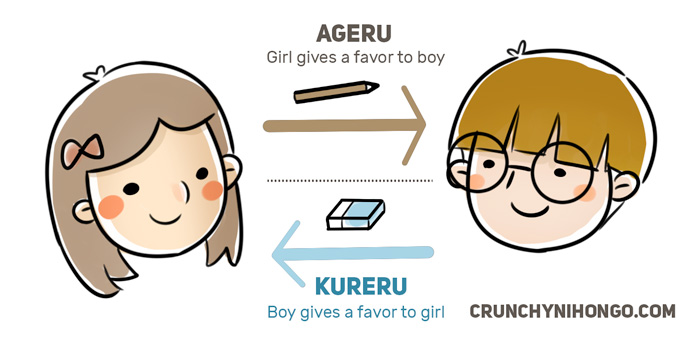Hi ! We hope this site helps you! ٩(ˊᗜˋ*)و As an Amazon Associate, we earn from qualifying purchases without additional cost. Click to read more about our Privacy Policy or Affiliate Disclosure
A lot of people get confused with あげる (ageru), くれる (kureru) and もらう (morau). We hope this article helps to clear things up!
What are those? Those words are words to talk about a giving / receiving event. “What’s hard about it?” you asked. Well, unlike in English where you can use the “give” in almost any case such as “He gave this to her“, “He gave me this” or “Teacher gave me this“, depending on who is giving and who is talking, you need to use the correct word.
The concept of Uchi and Soto in Japanese
In Japanese, there are these 2 big group. Uchi and Soto. Uchi means inside while Soto means outside. Uchi means you, your family or someone else you’re close with. While Soto means all the people beside the Uchi group.

But the concept of Uchi & Soto might be different in different situation. For example, your boss might be someone who you’re not close with. But in a situation where you’re meeting with someone from other company, your boss is your uchi since he is in the same company as you.


Why are we talking about this?? Because you need to understand this culture concept to make it easier to understand the difference between あげる (ageru), くれる (kureru) and もらう (morau). Now let’s begin!
あげる (ageru)
あげる (ageru) means to give. This word is used when you are talking from the GIVER point of view.
When we can use this word?
– When you are the GIVER
– When you are giving something / doing something to someone else
– When you talk about someone giving a gift based on the GIVER point of view
私が友達に本をあげた
watashi ga tomodachi ni hon o ageta
I gave books to my friend
About やる (yaru)
When you are talking about giving things to some living object with lower status such as animals, you use やる (yaru) instead of あげる (ageru)
牛に干し草をやった
ushi ni hoshikusa o yatta
I gave hay to the cows
くれる (kureru)
くれる (kureru) also means to give. But you use this word when you are talking from the RECEIVER point of view.
When we can use this word?
– When you are the RECEIVER
– When you are receiving something (either object or action) from someone else
– When you talk about someone giving a gift to people in your UCHI group based on the RECEIVER point of view
Uchi, as explained above means someone you emphatize with or someone who is close to you. Such as your family, your friend or someone you really know well. So you cannot use くれる (kureru) when you are talking about stranger or someone you’re not close with.
友達が私に本をくれた
tomodachi ga watashi ni hon o kureta
Friend gave a book to me
As you can see, when talking about あげる (ageru) and くれる (kureru), the most important thing is about identifying the GIVER and RECEIVER. When you want to say that you’re giving a favor to someone, you use あげる (ageru) and when someone else give a favor to you, you use くれる (kureru).

もらう (morau)
This is the last word we’re going to review. もらう (morau) means to receive or to get. This word has a nuance that you’re feeling grateful of what you’ve received. So you cannot use it for something that have negative nuance or about something that you don’t feel grateful about.
When we can use this word?
– When you or someone in your UCHI group received/got something good
Note that to mark the source of your gift, you need to use the particle に or から (from)
先生
sensei
I got a present
先生
sensei
I got a present
In Japanese, people tend to drop pronouns. With English version of ‘give‘, we will have a hard time to guess the meaning of ‘give‘ in a sentence. But with Japanese words, you can easily differentiate the meaning without the pronouns. Check these example below:
りんごをあげた
ringo o ageta
(I) gave apple (to someone)
りんごをくれた
ringo o kureta
(Someone) give an apple (to me)
りんごをもらった
ringo o moratta
(I) got an apple (from someone) *and I’m happy about it*
We hope this article helps you to understand the concept of あげる (ageru), くれる (kureru) and もらう (morau). These words are also used as auxilary verbs that are attached to another verb with the help of て and become 〜てあげる, 〜てくれる and 〜てもらう. When combined with another verb (action), it gives additional nuance according to the principle explained above. Check out examples below.
– 着る means to wear
– 着てあげる (kiteageru) means: To put on clothes for someone. The あげる (ageru) implies that you are giving a favor to someone by putting on the clothes.
– 着てもらう (kitemorau) means: To get someone to put on (clothes). The もらう (morau) implies that you are getting a favor from someone.
Happy learning! 。゚✶ฺ.ヽ(*´∀`*)ノ.✶゚ฺ。

useful, many thanks
Dear Crunchy Nihongo, I, and many many Japanese learners do appreciate your time and effort in building such a wonderful, informative, helpful and easy to understand website with simple and neccessary lessons.
We love Crunchy Nihongo and please never stop the webiste. This helps us so so much.
I wish you, everyone who is working on running Crunchy Nihongo a good health and happiness always.
Lots of hugs for you guys
How grateful we are to received comments such as yours. Thank you. And please pardon the slow updates. We don’t have many resources but we will certainly try to keep this site alive and adding more information to it.
This was so helpful, as a self Japanese learner. I’ve been teaching myself these words but did not know the difference between how to use each word for different scenarios. Reading this article made it very simple to understand. Thank you so much !
Is there a typo in the final example sentence for もらう?
The romaji seems to be correct, however you wrote から again, instead of に、in the Japanese example.
Thank you for noticing the error. It’s fixed 😀
In my textbook the description of Morau and Kureru were excactly the same, with no pointer to the difference. Thankyou so much for the article, I was confused about why I kept getting questions wrong!!
You’re welcome! We know it’s confusing sometimes and thus why we wrote the article 😉 Glad it helps!
What if another person is the reciever?
ex: She gave him an apple.
She gave him an apple = talking as from the giver point of view. So it’s “kanojo wa Ringo o Kare ni ageru”
or “He received an apple from her.”
Thank you very much, understanding the point of view role really made it clear!